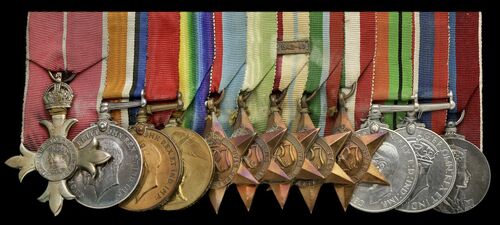Auction: 23001 - Orders, Decorations and Medals
Lot: 328
The Royal Fleet Auxiliary 'Operation Iceberg - Invasion of Okinawa' O.B.E. group of twelve awarded to Commodore W. B. Browne, Royal Fleet Auxiliary, late Royal Naval Reserve, who saw 'Q ship' service with Dunclutha and survived the sinking of Marmora; during the Second World War he proved an able Captain of the Wave Monarch
The Most Excellent Order of the British Empire, 2nd Type, Military Division, (O.B.E.) Officer's breast Badge, silver-gilt; British War and Victory Medals (); Mercantile Marine War Medal (); 1939-45 Star; Atlantic Star; Africa Star, clasp, North Africa 1942-43; Pacific Star; Italy Star; Defence and War Medals 1939-45; Coronation 1953, mounted court style as worn, good very fine (12)
O.B.E. London Gazette 11 June 1946:
'For distinguished services during the war in the Far East.'
William Brunswick Browne was born at Stepps, North Lanarkshire, Scotland on 28 September 1894. Serving with the Merchant Marine for the first two years of the Great War aboard the Glenorchy he later enlisted in the Royal Naval Reserve with the rank of Sub-Lieutenant on 8 March 1916. His first posting was with Pyramus but he was soon transferred to Philomel (in September 1916) and was transferred from here to Karachi on the northern tip of the Arabian Sea. In this location he was posted to serve as a gunnery officer aboard the Q-Ship Dunclutha, a converted collier. Keble-Chatteron notes this particular vessel in the book Q-Ships and their story, stating:
'Soon after this date the Q-ship Dunclutha left for that part of the Atlantic which is between the north-east coast of South America and north-west coast of Africa. This ship, together with Ooma, both of them being vessels of between 3,000 and 4,000 tons, had commenced their special service at the end of 1916 and been sent to work under the British Commodore off the east coast of South America in the hope of falling in with one of the German raiders, such as the Moewe. In May, 1918, both these vessels had to be withdrawn from such service, as the shortage of tonnage had become acute, and were required to load general cargo in a Brazilian port.'
Browne was to serve with her until 22 July 1918 when he was lent to the Armed Merchant Cruiser Marmora. This timing was extremely poor for Browne, as the very next day she was torpedoed off the southern coast of Ireland by the U-Boat UB-64. Surviving the loss of this vessel, Browne was sent to Cormorant and promoted Lieutenant on 6 March 1918, continuing to serve afloat until 24 August 1919.
Returning to the Merchant Marine he had reached the rank of Master by the outbreak of the Second World War; he was appointed Master of the fast tanker Wave Monarch from 3 July 1944 with her first convoy being UC 45A to New York. She was later part of the British task force assembled for operations against Okinawa (Operation Iceberg), arriving there on 13 March 1945.
Wave Monarch served in the area until late May when she headed to Australia by way of New Guinea. His Second World War Medal entitlement is confirmed on his Merchant Navy card and indicates a great deal of service prior to his position with Wave Monarch. He was further promoted Commodore and died on 19 September 1978; sold together with an R.F.A. patch, matching riband bar and a silver dog-tag (hallmarks for London) inscribed 'W. B. Browne Lieut. R.N.R.' along with copied research comprising a former auction listing, service papers and Merchant Navy medal card as well as a London Gazette extract and casualty list of R.F.A. members.
Subject to 20% VAT on Buyer’s Premium. For more information please view Terms and Conditions for Buyers.
Sold for
£480
Starting price
£280
Sale 23001 Notices
'British War and Victory Medals named 'Lieut. W. B. Browne. R.N.R.'. Mercantile Marine War Medal named 'William B. Browne.'.'







